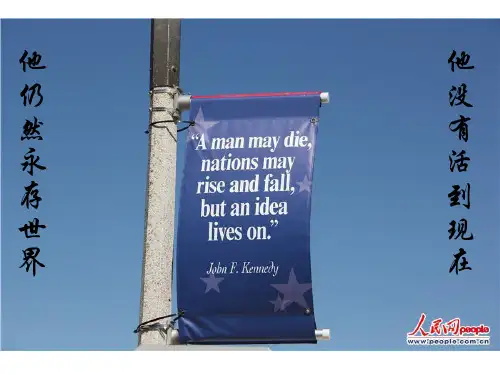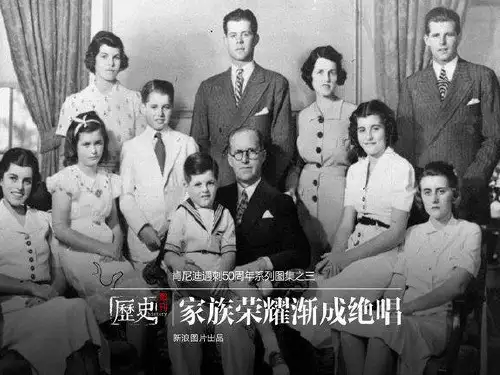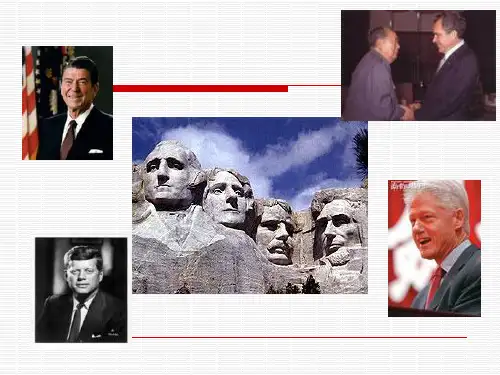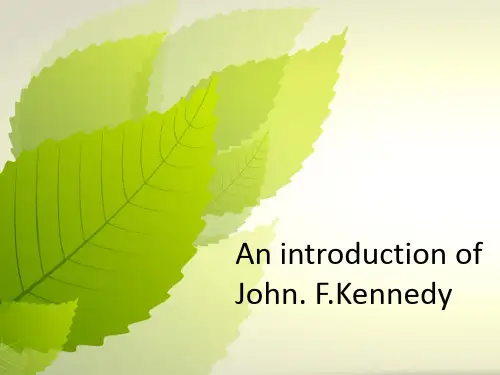肯尼迪家族.ppt
- 格式:pptx
- 大小:562.14 KB
- 文档页数:13









龙源期刊网
政治世家:肯尼迪家族家训
作者:
来源:《祝您健康·文摘版》2018年第07期
1. 亲手制作孩子的育儿日记与读书记录,然后对此进行彻底检查;(重视“阅读”)
2. 帮助孩子培养遵守时间的好习惯;(时间管理)
3. 教授孩子“取得第一名成绩的人不会被人无视”的世界法则;(领先意识)
4. 当孩子遇到困难时。
家长要站在孩子的角度上帮助他们解决问题;(同理心)
5. 让孩子进入名牌大学进行学习,使之获得最好的人脉关系;(人脉资源)
6. 告诉孩子要树立远大的目标,但切勿急躁,必须循序渐进才能取得成功的道理;(路径思维)
7. 让孩子明白,起初的笨拙与不适应,将会通过反复努力而变得熟能生巧的道理。
(实践出真知)。


August 27, 2009EDITORIALSenator Edward KennedyThree decades ago, Senator Edward Moore Kennedy ruined his last hope to be elected to the White House when a television interviewer asked him why he wanted to be president. He could not articulate an answer, offering instead a rambling, empty response that persuaded his party that he may not really have wanted or been suited for the job that his brother John had held and to which his brother Robert had aspired.Yet as so often happened in an extraordinary life that careened from success to misfortune and scandal and back to success again, this bumbling moment worked to Mr. Kennedy’s advantage and, as it turned out, to the even greater advantage of the nation as a whole. Having failed in his insurgent challenge to President Jimmy Carter, Mr. Kennedy was finally free to focus with passion and political craft on his more natural calling as one of the master legislators and great reformers in the modern Senate.The record Mr. Kennedy leaves after 46 years can only be envied by his peers as they join the nation in mourning his passing after a 15-month fight against brain cancer — a record firmly anchored in Mr. Kennedy’s insistence that politics be grasped and administered through the prism of human needs.Together with a hard-won mastery of parliamentary intricacies, and a willingness to reach across party lines to win crucial votes, Mr. Kennedy’s unwavering taproot liberalism left a robust legacy: signature laws and reforms on civil rights, the judiciary, refugees, social welfare, foreign policy (he was one of 23 senators to vote against authorizing the Iraq invasion), voting rights, job training, public education and the minimum wage.Last year, in his bittersweet adieu before the Democratic convention, the senat or stirred his party to act on what he called “the cause of my life” —quality health care as a fundamental right of American citizenship.The fate of Senator Kennedy’s cause remains in the hands of a conflicted Congress and President Obama, the Democratic candidate whom Mr. Kennedy dared to champion when other party leaders hesitated. And while his leadership will be missed in the intricate legislative warfare ahead, it would be a fitting tribute if his death could resolve for the better an issue too long in doubt.Mr. Kennedy’s life was burdened with personal tragedy, including the assassinations of two brothers, and personal embarrassment, mostlyself-inflicted. He was pronounced finished 40 years ago after Mary Jo Kopechne drowned in a car the senator drove off a bridge on Chappaquiddick Island off Martha’s Vineyard. But Massachusetts voters stuck with him, and in the last 15 years Mr. Kennedy seemed to get a much firmer grip on his personal life, not least in an effort to set a better example as the patriarch of the Kennedy clan.“I recognize my own shortcomings,” he conceded in 1991, knowing that they will not be erased from the pages of history. But neither will his spirit, his devotion to helping Americans in need and his belief that politics, not always a savory calling, can make a real difference. His mantra, forged in tragedy, and expressed most eloquently to the Democratic National Convention when he abandoned his presidential quest in 1980, was simple and ennobling: “The work goes on, the cause e ndures, the hope still lives, and the dream shall never die.” In his final speeches, he explicitly handed on this mantra to President Obama.This article has been revised to reflect the following correction: Correction: January 3, 2010An article last Sunday about the death of Edward M. Kennedy in August misstated the length of his tenure in the Senate. He served 47 years, not 46 years. (The error appeared in Mr. Kennedy’s obituary and another article, about memories of the Senator, on Aug. 27, and also in an editorial that day. The error was repeated in an article on Aug. 28 about how the Senate had changed during the time he served.) The article also referred incorrectly to the assassination of his brother President John F. Kennedy. The president was assassinated in 1963, the year after Edward Kennedy was elected to the Senate — not the same year.This article has been revised to reflect the following correction: Correction: January 10, 2010An article on Dec. 27 about the death of Edward M. Kennedy in August referred incorrectly to the assassination of his brother President John F. Kennedy, and a correction in this space last Sunday erroneously corrected the length of his tenure in the Senate. The president was assassinated in 1963, the year after Edward Kennedy was elected to the Senate —not the same year. And as the article correctly reported, Senator Kennedy served 46 years — not 47 as the correction said. (The correction also erred in stating that the length of tenure was incorrect in Mr. Kennedy’s obituary, in two other articles on Aug. 27 and Aug. 28 and in an editorial on Aug. 28. All four correctly reported the tenure as 46 years.)。
John F. KennedyThe early yearsJohn Fitzgerald Kennedy was born in Brookline, Massachusetts on May 29, 1917, the great-grandson of Irish immigrants. Young Jack Kennedy was the second child in a family that would eventually have nine children. He was sickly as a child and continued to have health problems in the rest of his life. Despite his illnesses, Jack liked to compete in sports, the competitive spirit largely encouraged by his father. He attended private schools his whole life including the famous prep school, Choate. He then attended Harvard (1936-40) majoring in Political Science. John Kennedy was an active undergraduate and graduated cum laude. Graduating from Harvard in 1940, he entered the Navy.The War Hero•In World War II , he was a naval officer.In 1943, when his PT boat was rammed and sunk by a Japanese destroyer, Kennedy, despite grave injuries, led the survivors through perilous waters to safety. Shortly after the war ended, his political career began.The politicianBack from the war, he became a Democratic Congressman from the Boston area, advancing in 1953 to the Senate. He married Jacqueline Bouvier on September 12, 1953. In 1955, while recuperating from a back operation, he wrote Profiles in Courage, which won the Pulitzer Prize in history.The presidentIn 1960, Kennedy was nominated to run for the presidency against Richard Nixon, Eisenhower's Vice President. Millions of people watched his television debates with the Republican candidate, Richard M. Nixon. Winning by a narrow margin in the popular vote, Kennedy became the first Roman Catholic President.His Inaugural Address offered the memorable injunction: "Ask not what your country can do for you--ask what you can do for your country." As President, he set out to redeem his campaign pledge to get America moving again. His economic programs launched the country on its longest sustained expansion since World War II; before his death, he laid plans for a massive assault on persisting pockets of privation and poverty.Responding to ever more urgent demands, he took vigorous action in the cause of equal rights, calling for new civil rights legislation. His vision of America extended to the quality of the national culture and the central role of the arts in a vital society.He wished America to resume its old mission as the first nation dedicated to the revolution of human rights. With the Alliance for Progress and the Peace Corps, he brought American idealism to the aid of developing nations. But the hard reality of the Communist challenge remained.Foreign policy problems facing KennedyCold War rivalries with RussiaThe Bay of Pigs Fiasco 1961(US assisted invasion of Cuba exiles fails disastrously)The Berlin Wall 1961Cuban Missile Crisis 1962While the world trembled on the brink of nuclear war, the Russians backed down and agreed to take the missiles away. Kennedy now contended that both sides had a vital interest in stopping the spread of nuclear weapons and slowing the arms race--a contention which led to the test ban treaty of 1963. The months after the Cuban crisis showed significant progress toward his goal of "a world of law and free choice, banishing the world of war and coercion." His administration thus saw the beginning of new hope for both the equal rights of Americans and the peace of the world.On November 22, 1963, when he was hardly past his first thousand days in office, John Fitzgerald Kennedy was killed by an assassin's bullets as his motorcade wound through Dallas, Texas. Kennedy was the youngest man elected President; he was the youngest to die.Historical SignificanceJohn Kennedy was important more for his iconic reputation than his legislative actions. His many inspiring speeches are often quoted. His youthful vigor and fashionable First Lady were hailed as American royalty; his time in office was termed "Camelot."。
卡罗琳·肯尼迪美国第35任总统约翰·肯尼迪和第一夫人杰奎琳·肯尼迪的女儿,被美国人称为“全国的宝贝”。
2013年7月12日日本共同社报道,其即将出任驻日大使,并将成为首名担任这一职务的女性。
卡罗琳·肯尼迪已经获得总统贝拉克·奥巴马提名,提名有望获得美国国会参议院批准。
美国参议院2013年10月16日正式批准卡罗琳·肯尼迪出任美国驻日本大使。
将于2013年11月15日赴任的卡罗琳·肯尼迪是美国前总统约翰·肯尼迪的长女,现年55岁,她将是美国首个女性驻日大使。
[1]目录1人物简介2成长过程3人物生平4家族情况5其它1人物简介卡罗琳·肯尼迪(Caroline Kennedy,1957年11月27日),律卡罗琳·肯尼迪师、作家。
美国第35任总统约翰·肯尼迪和第一夫人杰奎琳·肯尼迪的女儿。
卡罗琳是肯尼迪家族中形象最好的一位,被美国人称为“全国的宝贝”。
说到棕发碧眼的总统之女卡洛琳·肯尼迪。
英俊的父亲,美丽的母亲,加上惹人喜爱的孩子,给美国公众树立了完美家庭的形象。
肯尼迪的女儿出生后,“卡洛琳”这一名字成了许多父母给女儿取名的首选,卡洛琳是肯尼迪风格的一部分。
父亲公开露面时,人们关注的是卡洛琳的举动,而不是总统。
小卡洛琳的顽皮可爱和她与父亲的感情使女儿在公众心中分量大增。
父亲遇刺后,人们见到了肯尼迪家孩子们的新形象。
在大家哀悼她那受人爱戴的父亲时,卡洛琳沉静地站在母亲和小弟弟约翰身边,像个小大人。
2成长过程2008年12月,卡罗琳·肯尼迪表示有意涉足政坛,填补纽约州联邦参议员希拉里出任国务卿后留下的职位空缺,接任参议员。
卡罗琳虽贵为前总统之女,但向来行事极为低调,以至外界对这位昔日“第一千金”了解并不多。
英国《卫报》搜集到卡罗琳成长过程的一系列老照片,揭开了这位前总统女儿的神秘面纱。